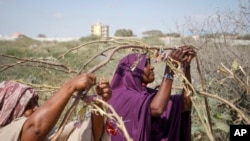Somalia’s federal government has declared a state of emergency due to a severe drought that is ravaging the country. The drought has contributed to an unprecedented water crisis that has led to a shortage of safe drinking water, poor sanitation and an outbreak of disease.
As a result of drought in Somalia's Middle Juba region, Fadumo Muse a mother of seven, had to leave her home and seek shelter at a camp on the outskirts of Mogadishu.
The camp has not been the refuge she was hoping for. A few days after the family’s arrival, some of her children fell ill.
She said her family faces the same problem they faced before moving: severe shortages of water. Now her children are ill with diarrhea and they have not been provided with any medication or aid.
Muse is one of hundreds of thousands of Somalis who fled their homes due to the prolonged drought that hit central and southern Somalia especially hard.
The drought has led to a shortage of clean drinking water, a problem with effective sanitation, and an increase in waterborne diseases such as diarrhea, cholera and typhoid.
Dr Abdirizaq Yusuf, director of Mogadishu’s Martino hospital, said his facility has been overwhelmed with cases of waterborne disease.
He said children are frequently infected with acute watery diarrhea, which can cause massive death and social catastrophe.
Mohammed Hussein Abdi, the head of the Green Watch Trust, an organization dedicated to environmental protection, said the outbreaks can only be controlled with better coordination between authorities on the local and national levels.
He said a poor drainage system in the capital compounds the problems, as contaminated water overflows through neighborhoods during the rainy season. This often leads to outbreak of diseases, as children freely play in the stagnant pools of water, he told VOA.
The rainy season is due to arrive next month and will hopefully bring relief to all of Somalia. Meteorologists say rainfall is most likely to be average to below average.




